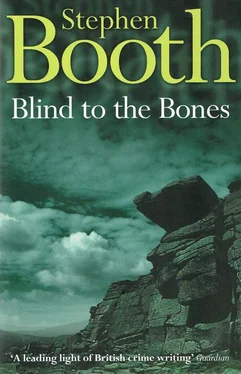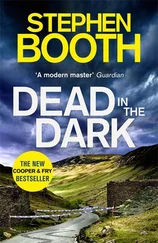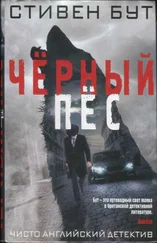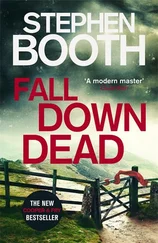‘I’d like you to leave now,’ she said.
Ben Cooper had rarely felt so impotent as he stood in the track watching the houses. He could hear children running up the passage behind the terrace, whispering to each other and brushing against the fencing. Smoke began to rise from one of the chimneys, and the smell of cooking was coming from somewhere, maybe from the open window at number 1. If he wasn’t mistaken, the children were going to be served microwaved pizza for tea. He couldn’t quite name the flavour, but it was something with onions, and the smell was making him salivate. Even worse was the feeling of isolation when Cooper heard a back door slam and the voices of the children were cut off as they entered one of the houses. That eerie Withens silence fell again, broken only by a clap of wings from pigeons taking off from the roof.
He began to feel foolish and lonely standing there trying to picture the scene indoors. He was frustrated not to know for sure which of the houses the children had gone into, or which adult was in charge of the microwave. Or was it an adult? Any one of the older Oxley children would be perfectly capable of taking a couple of pizzas out of the freezer and opening a family-sized tin of baked beans. Or maybe even one of the younger kids. Some children learned to look after themselves from a very early age, out of sheer necessity. And the Oxleys were nothing if not independent.
‘Damn and blast.’
Cooper began to walk back to the car, feeling like the single person at Christmas, shut out of all the family fun just when everybody was supposed to be enjoying themselves most. He felt exposed, too, as if the whole population of Withens was watching him from behind its curtains, laughing at his powerlessness.
‘Diane, you don’t understand,’ he said. ‘It’s time you came down here and saw for yourself.’
But not all the Oxley children were home for their tea. There were three boys standing in the road in front of the bus shelter. They had been playing with a football, but now one of them was holding it under his arm. As Cooper watched, the youngest one, Jake, began to make his way across the road towards the other two boys. He walked with a noticeable limp, as if one leg were shorter than the other. But it didn’t seem to hinder him too much. When one of the others threw the ball down again, he ran for it nimbly enough, and kicked it with his good leg towards the car park.
It was the stationary car standing in the middle of the road that drew Cooper’s attention from the boys. The vehicle was a Mitsubishi pick-up, with its engine still running as if it had come to a sudden halt. But it stood in the centre of the carriageway, where it would cause an obstruction if anyone wanted to get past.
Then Cooper recognized the driver. It was Michael Dearden, frozen behind his steering wheel, staring at the Oxley boys like a rabbit caught in headlights. Cooper had rarely seen a grown man look so frightened.
Wednesday
Randy had spilled soil out of a plant pot in the conservatory. Ben Cooper brushed it up, rearranged the pots more neatly on their shelves, pushed the cat’s basket back into its corner and straightened the plaid blanket it was using as a bed.
He looked for other things to tidy, decided that the back door needed painting some time soon, brushed some cobwebs off a pane of glass. He stared through the glass, where he could make out the shapes of the trees against the lights of the houses in Meadow Road. The branches were just starting to come into leaf, and their outlines against the light were fuzzier and less stark than they had been all winter. Growth was progressing here, too.
He went back into the kitchen and shut out the sight of the garden. In the porch, there were some letters behind the front door. One advantage of living in town was that his mail came early in the morning, before he left for work if he was on a day shift. At Bridge End Farm, out there beyond even the smell of the town, the mail was delivered about lunchtime.
‘What have we got today then, Randy? Would you like a new credit card? A loan to help you pay for a foreign holiday, perhaps? Want to join a book club?’
Randy looked at him contemptuously and licked his lips.
‘Yes, I know what you want. I was only kidding. Hello, what’s this? A postcard.’
The postcard had a picture of Chatsworth House on it. He always liked to try to figure out who a postcard was from before he turned it over to look at the message, but he couldn’t think who would bother to send him a card from Chatsworth, when it was only a few miles away.
When he finally looked and saw who the card was from, his first uncharitable thought was that she must have stolen it from the souvenir shop. But that didn’t make sense, really. She would have had to pay to get into Chatsworth House in the first place.
The message said: ‘Sorry about the other day. You were great, so thanks. I know you’ll make the right decision.’ It was signed: ‘Love, A’.
‘It’s from Angie,’ said Cooper.
Randy made a noise like a bird chirruping, then began to cough, as though trying to clear a hair ball from his throat.
‘Give over,’ said Cooper. ‘You’re not dying of starvation just yet.’
The cat got up and stalked off towards the kitchen with its tail twitching.
‘Angie,’ said Cooper, reading the postcard again. ‘What does she mean by “I know you’ll make the right decision?” What right decision?’
This time, the cat didn’t answer. It was in the kitchen and pretending it couldn’t hear him. Cooper turned the postcard back over and frowned at the picture of Chatsworth House, as if it could have some hidden significance he was supposed to figure out. Chatsworth? Was there a connection? Was she trying to tell him something?
‘It’s too subtle for me,’ he said.
He dropped the mail on the table and headed towards the kitchen. ‘Randy,’ he said, ‘why the hell have I started talking to myself?’
Copies of the Social Services report on the Oxleys had arrived on Cooper’s desk at West Street. The visits to Waterloo Terrace were summarized, along with meetings at the Social Services offices. It took several sheets. Cooper knew he was unlikely to have time to read the older stuff. The visits had started in 1986, and the most recent was four weeks ago, at the beginning of April.
Taken together with visits by their landlords, Peak Water, by officials from other council departments such as environmental health and education, and from the police, it would make a pretty intimidating list. No wonder his own appearances day after day had failed to impress the Oxleys. He must have seemed the latest of a long line of official busybodies, anxious to interfere in their lives, poking their noses in, demanding information about their private affairs. And all, obviously, with the purpose of finding an excuse to get them out of their homes. The fact that any of the Oxleys had spoken to him at all ought to be taken as a compliment. Even ‘bugger off’ was more than some of the council representatives had achieved.
Cooper took a call while he was reading the reports on the Oxleys boys again. It was Fran Oxley.
‘Do you still want to talk?’ she said.
‘Of course.’
‘I thought you might have given up by now.’
‘I won’t be giving up.’
‘Can you come to see me tonight? It’ll have to be latish, about nine? I’ll be home from work then.’
‘Yes, I’ll be there. What do you want to talk about?’
Fran hesitated a moment, but seemed to make up her mind. ‘If you come tonight,’ she said, ‘I’ll tell you about Neil.’
Cooper was smiling when he put the phone down. The fact of somebody actually speaking to him gave him a surge of satisfaction. For a moment, it crossed his mind that it might be a con, a practical joke by the Oxleys. But Fran had sounded sincere, if a little hesitant.
Читать дальше
Конец ознакомительного отрывка
Купить книгу












